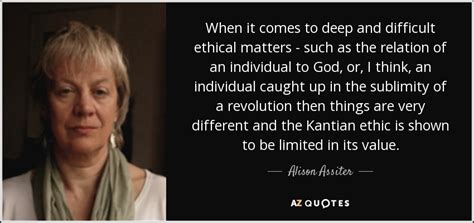A Quote by Alison Assiter
When it comes to deep and difficult ethical matters - such as the relation of an individual to God, or, I think, an individual caught up in the sublimity of a revolution then things are very different and the Kantian ethic is shown to be limited in its value.
Related Quotes
It is very difficult to explain this feeling to anyone who is entirely without it, especially as there is no anthropomorphic conception of God corresponding to it. The individual feels the nothingness of human desires and aims and the sublimity and marvelous order which reveal themselves both in Nature and in the world of though. He looks upon individual existence as a sort of prison and wants to experience the universe as a single significant whole.
Faith is precisely the paradox that the single individual as the single individual is higher than the universal, is justified before it, not as inferior to it but superior - yet in such a way, please note, that it is the single individual who, after being subordinate as the single individual to the universal, now by means of the universal becomes the single individual who as the single individual is superior, that the single individual as the single individual stands in an absolute relation to the absolute.
Participation in the collective life of the polis both restrains the extraordinary individual and enlarges the ordinary individual, allowing him to participate in the extraordinary. An individual can achieve participatory excellence via the accomplishments of the polis and need not always be caught up in the agnostic struggle to outdo his peers.
We're mathematically past the point where the accumulation of individual actions can add up quickly enough to make a difference. The individual action that actually matters is not being an individual. It's joining together with other people in groups large enough to change the political dynamic around climate change.
The psychoanalysis of individual human beings, however, teaches us with quite special insistence that the god of each of them is formed in the likeness of his father, that his personal relation to God depends on his relation to his father in the flesh and oscillates and changes along with that relation, and that at bottom God is nothing other than an exalted father.
But if we believe what we profess concerning the worth of the individual, then the idea of individual development within a framework of ethical purpose must become our deepest concern, our national preoccupation, our passion, our obsession. We must think of education as relevant for everyone everywhere - at all ages and in all conditions of life.
































